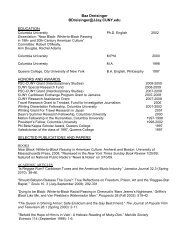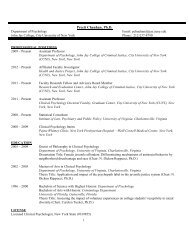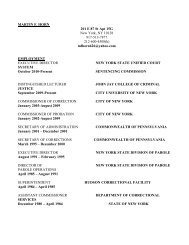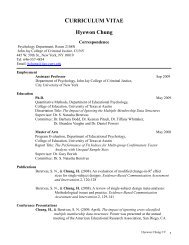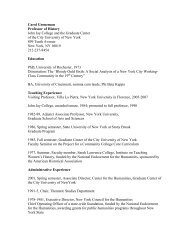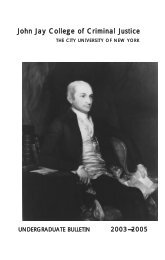Bulletin - John Jay College Of Criminal Justice - CUNY
Bulletin - John Jay College Of Criminal Justice - CUNY
Bulletin - John Jay College Of Criminal Justice - CUNY
You also want an ePaper? Increase the reach of your titles
YUMPU automatically turns print PDFs into web optimized ePapers that Google loves.
Courses <strong>Of</strong>fered<br />
readers to question their own personal, but perhaps unexamined<br />
positions and judgments regarding ethical issues. Topics may include<br />
the ethical dimensions of responsibility, loyalty, obligation, equity,<br />
honesty, and secrecy. We will examine how cultural and societal<br />
norms, the rule-of-law, and “higher” or divine laws make competing<br />
demands on characters, how characters negotiate those demands, and<br />
how others respond. In our analysis we will apply and compare<br />
philosophical principles, including rule-based, situational, and<br />
utilitarian and other consequentialist arguments concerning the<br />
“right” thing to do. Selected readings from primary texts in ethics<br />
will provide a background for the analysis of literary texts.<br />
Prerequisites: ENG 102 or 201, PHI 231, and one of the following:<br />
LIT 230 or 231 or 232 or 233<br />
LIT 313 Shakespeare<br />
3 hours, 3 credits<br />
Shakespeare's plays are engaged with the complexities of his time,<br />
and they also speak to ours. Working with a selection of plays,<br />
students will develop skills in the close reading of early-modern<br />
drama, learning how character, language, and dramatic form (tragedy,<br />
comedy, history, romance) shape meaning. They will analyze the<br />
intellectual, moral, social and political issues that Shakespeare<br />
explores, especially those involving justice, governance, the family,<br />
race, and gender. Because Shakespeare wrote his plays for<br />
performance, students will also analyze them as scripts by watching<br />
films and through their own performance.<br />
Prerequisite: LIT 230 or LIT 231 or LIT 232 or LIT 233<br />
LIT 314 Shakespeare and <strong>Justice</strong><br />
3 hours, 3 credits<br />
This course examines Shakespeare’s representation of justice in its<br />
connections to social and political order, crime and the law. The<br />
investigation will be both historical, situated within early modern<br />
understandings of justice, and aesthetic, situated within<br />
Shakespeare’s dramatic vocabularies. What are the connections<br />
between poetic justice and legal, social, and religious justice How<br />
do such connections order plot, character, and structure And finally:<br />
how do Shakespeare's representations of justice and injustice support<br />
or challenge early modern ideas of justice Students will explore<br />
these questions through close analysis of selected plays and affiliated<br />
historical readings, and through their performance of scenes key to<br />
Shakespeare’s articulations of justice.<br />
Prerequisites: ENG 102 or 201, and LIT 230 or LIT 231 or LIT 232<br />
or LIT 233<br />
LIT 315 American Literature and the Law<br />
3 hours, 3 credits<br />
The course will bring together American literary and legal texts in<br />
order to examine the ways in which the two can illuminate each<br />
other. It will focus on the works of American literature that take law<br />
as their central theme; works that include trials or are inspired by<br />
famous cases; works that have lawyers as protagonists; and works<br />
that address issues of law and justice. Students will also bring<br />
methods of literary analysis to bear on the study of important cases or<br />
legal decisions in order to understand the rhetoric of law, the unstated<br />
assumptions contained in it and the voices excluded from it.<br />
Prerequisite: one of the following: LIT 230, LIT 231, LIT 232 or LIT<br />
233<br />
LIT 316 Gender and Identity in Literary Traditions<br />
3 hours, 3 credits<br />
This course will provide a close examination of how gender functions<br />
to shape both authorship and literary text. Students will investigate<br />
how writers use conventions of sex and gender, and how readers<br />
critically assess these literary representations. The instructor will<br />
choose the genre and periodization in any given semester. Emphasis<br />
will be divided between primary literary texts, relevant historical<br />
documents and selected theoretical commentary.<br />
Prerequisite: one of the following: LIT 230, LIT 231, LIT 232 or LIT<br />
233<br />
111



